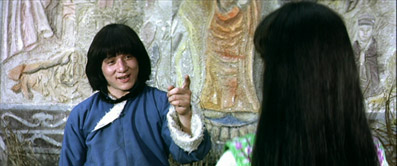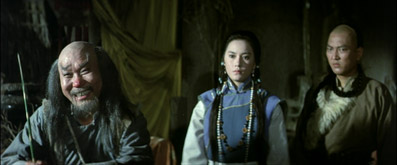|
It
is a time of conflict between the eight martial arts schools
of the Shaolin teaching, but once a year the masters of
each school put aside their differences and meet to demonstrate
their skills and learn from each other, and to combine their
teachings to create a unique and powerful fighting technique
known as The Eight Steps of the Snake and the Crane. But
one year this meeting results in the mysterious disappearance
of all eight masters. A book containing the secrets of The
Eight Steps of the Snake and the Crane is known to have
survived and is being hunted by everyone from devoted kung-fu
students to master criminals. It is revealed to be in the
possession of young, self-confident Hsu Ying-fung (Jackie
Chan), who has clearly mastered the technique and is thus
capable of repelling any attempt to take the book from him.
Ying-fung, who appears immune to both bribery and the charms
of beautiful women, has a quest of his own, to locate a
man with a distinctive mole on his left shoulder, someone
he clearly, for reasons he will not reveal, intends to do
battle with.
It's
a neat set-up that, once established, is all the plot you
need to get you to the inevitable final fight between Ying-fung and a man
whose identity every genre fan alive will be able to guess
as soon as he's introduced. He is, after all, the expected
Baddest Guy in Town and head honcho of the Black Dragon
Gang – if there's someone else with a mole on his shoulder
then he's going to have to wait in line. Everything that
happens between the setup and the climactic fight is extra
business to provide narrative complication and motivation
for punch-ups – no surprises or complaints there, but the
density of both does tend to catch you out. Just about everyone
appears to be after that book, and Ying-fung can't walk down
the street or sit down for a meal without someone or other
turning up and trying to snatch it from him. More interesting
hopefuls include girl-dressed-as-a-boy Yellow
Pearl and her father Huang of Fort Tiger, a cheerful Lord
of the Beggars, the beautiful but deadly Lady Sun of the
Fragrant Room, and the equally alluring Miss Tang, who believes
the book will lead her to her vanished father.

Plot
turns get so busy that you need to stay alert to keep up with
them. Allegiances are formed and broken almost on a whim,
as groups that are trying to kill each other one minute
join forces against a third party the next, and you're rarely
sure just who the good and bad guys really are, or indeed
if we can even apply such familiar generic pigeonholing.
The only one we (and Ying-fung) can rely on is the charmingly
named Oddball Yu, a man whose kung-fu is about as good as
mine but who will leap into a fight regardless and thump
enough of the enemy to give his companions an edge.
The
fight choreography, courtesy of Chan and co-star Du Wei
Her, is always energetic, often
imaginative and very smartly staged. A number of sequences serve as pointers
to the direction Chan's career was already heading, from his almost
dance-like acrobatics and incorporation of props and furniture into battles to the introduction of light-hearted elements, early signs
of the comedy-action style for which he was later to become
renowned. Barely five minutes pass without a fight breaking
out, and although the effectiveness of a few are hampered
by unimaginative camera placement (the first restaurant
fight in particular almost screams for better coverage),
others are impressively staged to camera, including an ambush
in a deserted and ramshackle house and the inevitable extended
final battle between Ying-fung and the mole man. The latter
is interrupted mid way to allow Chan to really show his
acrobatic and choreographic worth by dodging and weaving
through an attack by three spear-wielding assassins, a sequence
that Chan was to recycle the following year in Fearless
Hyena. This is the second such stand-alone
demonstration of his acrobatic skills in the film – the
opening credits, in which Chan performs a variety of moves
using spears and swords against a plain red studio backdrop,
play almost like an extract from a documentary on the Peking
Opera.
Hong
Kong Legends appear to be on a mission to restore and release
just about every early Jackie Chan film they can lay their
hands on, and for genre fans this is definitely good news, allowing
us to chart his route from supporting player to international
superstar on discs of generally impressive quality. Snake
& Crane Arts of Shaolin is an important link
in that chain, with Chan's star billing, likeable confidence
in the lead role and action director credit complimented
by the early signs of a drift towards a more comedic approach, which by Fearless Hyena (Chan's
first full credit as director) was more or less full realised.
But Snake & Crane Arts of Shaolin is
also a damned good old-school martial arts film, its busy
narrative and energetic action serving as a fine backdrop
for the well showcased skills of its emerging star.
Another
Hong Kong Legends Ultrabit title and one that generally
deserves the badge. The 2.35:1 anamorphic transfer is impressively
sharp and at its best the contrast and colour are equal
to that of many more recent releases. There is some variance
in both, especially colour saturation, suggesting more
than one source has been used for this version. Although
there is some damage to the original print still visible,
it has been effectively reduced and is rarely intrusive (it
is probably most evident on the plain red background of
the opening credit sequence). There are also a fair few
dust spots still present, but they are never distracting.
A single shot has serious focus issues, which is again likely
to be down to the original print(s). On the whole, a very
decent job from an imperfect original.

The
original Mandarin mono track is joined by a 5.1 remix and
a 5.1 English dub. Actually the Mandarin is a dub too, as
ever, but somehow a film with an all-Chinese cast and set
in historical China sounds a little less silly when the
characters don't talk like American z-movie gangsters. The
difference in sound quality between the music (which is
starting to break up) and some of the sound effects on the
5.1 tracks suggests some of the effects have been re-recorded
for this mix. That aside, the 5.1 offers few real advantages
over the mono track, apart from a very rare use of the rear
speakers and a bit more bass on some of the effects and
music.
The
optional English subtitles frequently offer a rather different
interpretation of the dialogue to the English dub, more
in the detail than the overall thrust of conversations.
Not being a Mandarin speaker, I can't vouch for the authenticity
of either. The subtitles do tend to feel somewhat literal
in places, with little account is taken of how the characters
would actually speak. Explaining why she feels a bond to
Ying-fung, for example, the tough, no-nonsense Yellow Pearl
tells him: "You're the first man I've known who isn't
a sycophant."
It's
an Ultrabit title, and regulars will know what that means
– no extras. There are trailers for three other HKL releases
by Chan, but I don't count these.
Jackie
Chan fans will need no encouragement and should be well
happy with both the film itself, which is a lively vehicle
for its then up-and-coming star, and the DVD, despite the
usual moan about the lack of extra features. But the picture
looks good and the sound is as stable as you're likely to
get, and given the treatment such titles received in the
VHS days, it's good to see the film so resurrected.
|